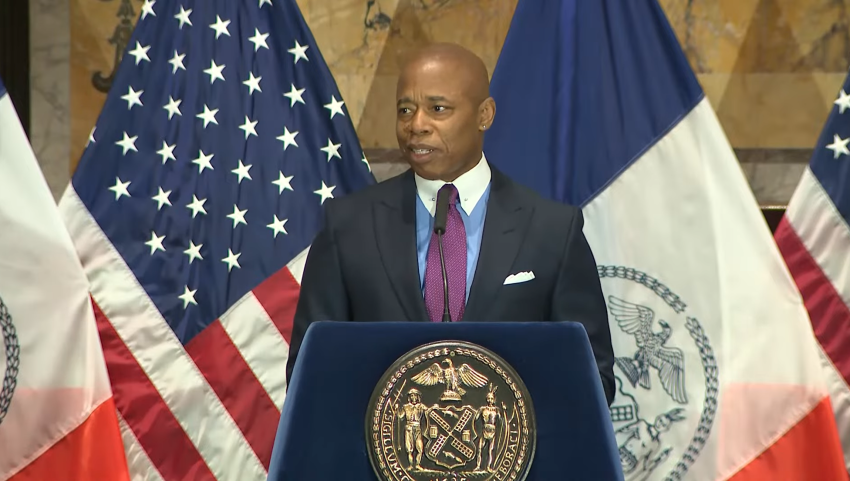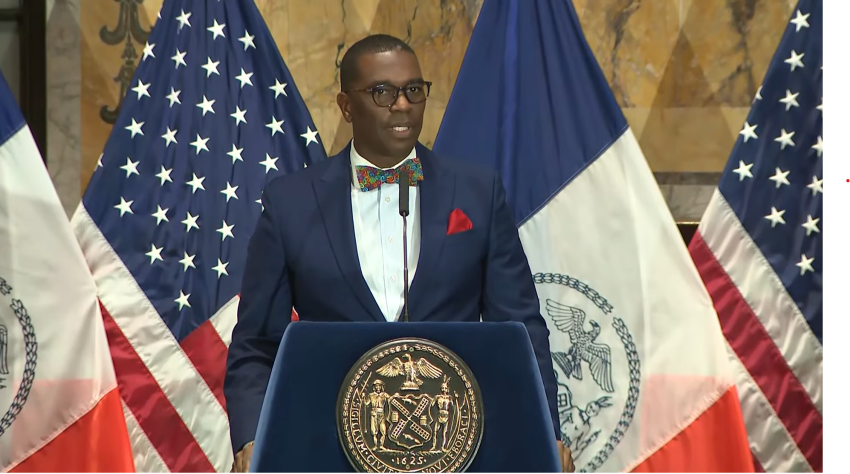NYC Mayor Eric Adams says it was a mistake to take prayer out of public schools

Just over a year after creating his Office of Faith-Based and Community Partnerships, New York City Mayor Eric Adams urged faith leaders to boldly exercise their faith in the public square and said it was a mistake for the U.S. Supreme Court to ban school-sponsored prayer in public schools.
Speaking at his annual interfaith breakfast at the New York Public Library’s reception hall on Tuesday, Adams said that by confining the exercise of faith to houses of worship, society, in general, is being denied its power as a force for good.
“When I was growing up in South Jamaica, Queens, I was learning how to box and every time I would get in the ring, I would lose the fight. And my trainer [would] say, ‘Eric, the problem is you leave your best fight in the gym, and you're supposed to take it into the ring with you.’
“And that is what has happened to many of us. The synagogue is the gym. The church is the gym. The Sikh temple is the gym. The mosque is the gym. You are there for training. You are not there to leave your best worship in the gym,” Adams insisted.
He noted that many social ills challenging communities today could be alleviated by people leading a more faith-filled life.
“We would not have a crisis of domestic violence. ... When we took prayers out of schools, guns came into schools. So the reflection point of today, when we do an analysis of these annual coming-together, is to state, ‘Are we leaving our best fight in the gym? Are we finding ways to really take what we took in the gym and bring it into the real fight?’” Adams asked.
In 1962, the Supreme Court ruled in Engel v. Vitalethat school-sponsored prayer in public schools violated the establishment clause of the First Amendment.
The case was triggered by a dispute over a 22-word nondenominational prayer recommended to school districts by the New York Board of Regents that said: “Almighty God, we acknowledge our dependence upon Thee, and we beg Thy blessings upon us, our parents, our teachers and our Country.”
Though the practice of the prayer was voluntary, and students could be excused from the prayer with a written request from their parents, when The Union Free School District in New Hyde Park, N.Y., adopted the recommendation some parents, including Steven Engel, argued that it was a violation of the First Amendment.
Adams argued that pushing faith out of the education system has helped to fuel despair people increasingly struggle with every day.
“We became so modernized that our new response is to act like we don't see the despair that people are experiencing every day. We’ve become so hip, so cool, so Instagram-ish, so Facebook-ish, so Twitter-ish, that we have TikToked our way out of the humanity that we've always known,” he said.
“And then we say to ourselves — this is what I find interesting — we say to ourselves, ‘What's wrong with these children? What's wrong with these kids?’ Let me tell you something about being a child, children look for indicators that are they moving in the right direction? You ever see your baby when all of a sudden, they're doing something wrong, and they look over and peep at you and to see what's going on? Now, when they peep over to see if they're doing something wrong, the parents are doing the same thing. We have abandoned the role of what it is to be a parent.
“We need to build children, that's better for our world. And we have to be honest about that,” Adams said.

“And it means instilling in them some level of faith and belief. … Don't tell me about no separation of church and state. State is the body. Church is the heart. You take the heart out of the body, the body dies. I can't separate my belief because I'm an elected official. When I walk, I walk with God. When I talk, I talk with God. When I put policies in place, I put them in with a God-like approach to them,” he added. “That's who I am. And I was that when I was that third grader, and I'm going to be that when I leave government. I am still a child of God and will always be a child of God, and I won't apologize about being a child of God. It is not going to happen.”
Adams who identifies as Christian with no specific denomination, credited God and the faith community for his rise to become mayor.
“I'm here because of the faith-based institution. You do not take this journey on your own. I strongly believe in all my heart, God said, ‘I'm going to take the most broken person and I'm going to elevate him to the place of being the mayor of the most powerful city on the globe,’” the mayor said.
“He could have made me the mayor of Topeka, Kansas. He could have made me the mayor of some small town or village somewhere. He stated that, ‘I'm going to take this broken child, this individual who is the epitome of the mistakes a human being can make in a lifetime, and I'm going to elevate him to the most important city in the country,’” he added. “That's only God. That's not man. That's only God. And so today, we proclaim that this city, New York City, is a place where the mayor of New York is a servant of God.”
While Adams insists that he will not separate his faith from his work, his speech on Tuesday raised concern among some activists like NYCLU Executive Director Donna Lieberman.
“We are a nation and a city of many faiths and no faith. In order for our government to truly represent us, it must not favor any belief over another, including non-belief,” Lieberman said in a statement reacting to the mayor’s speech.
“It is odd that Mayor Adams would need a refresher on the First Amendment. After all, he has sworn to uphold the Constitution more than once, first as a police officer, later as a state representative, and then last year upon becoming mayor. The very opening passage of the Bill of Rights makes clear that church and state must be separate,” she said. “On matters of faith, the Mayor is entitled to his own beliefs. On the Constitution, he must uphold his oath.”
In a statement to The New York Times, Fabien Levy, a spokesman for Adams, noted that all the mayor was saying in his speech is that faith guides his actions.
“As the mayor said before an interfaith group comprising hundreds of representatives from a multitude of religions, you can’t remove the heart from the body,” Levy said. “The policies we make as an administration are rooted in the mayor’s belief in the creator.”
Others, like Gilford Monrose, executive director of the New York City Office of Faith-Based and Community Partnerships, and lead pastor of the historic Mt. Zion Church of God 7th Day, praised the mayor after his speech for helping to highlight the importance of the faith community in the life of the city.
“I really want to thank Mayor Adams for his commitment to the faith community,” Monrose said. “Very important to understand ... we don’t want to be a city that is a soulless city. [It’s] not just about buildings, but about people.”



























